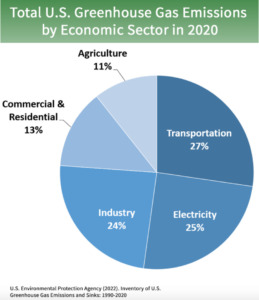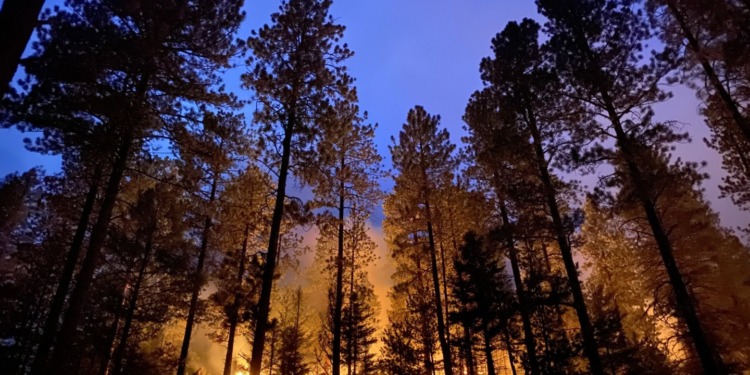“Did you know that New Mexico’s oil and natural gas industry funds more than $1.4 billion towards public education?” Through continuous advertisements, the oil and gas industry makes it quite clear they contribute billions of dollars to schools across the state of New Mexico and quite frankly that the schools can’t survive without them.
Yet on Wednesday, New Mexico’s governor pleaded for a presidential disaster declaration as wildfires sweep across the state. Not only does the oil and gas industry contribute enormous amounts of money to public education that continues to fund the school system, but also contributes to the rise of climate change and natural disasters — a contradiction with many problems and few solutions.
New Mexico battles largest active wildfire
April’s fire weather conditions were the worst the state has seen in more than a decade and currently seven wildfires are burning in the state of New Mexico — the most in any state according to the National Interagency Fire Center.
The National Weather Service in Albuquerque is calling it a “dangerous, long duration and potentially historic critical fire weather event.”
We cannot overstate it enough!!! The next several days will be windy & exceptionally dry with above normal temperatures & unstable conditions. This long duration critical fire weather event will require all New Mexicans to be diligent & cautious! #NMwx #NMfire #OneLessSpark pic.twitter.com/rhVxpVPlMt
— NWS Albuquerque (@NWSAlbuquerque) May 6, 2022
Already, roughly 223,979 acres of land have been scorched and more than 6,000 persons have been evacuated.
The string of deadly wildfires started back in April. In late April, the Hermit’s Peak fire and the Calf Canyon fire converged creating the largest wildfire in the state’s history — just in the last week 160,000 acres were scorched by the Hermit’s Peak/Calf Canyon fire. If the fire continues to grow, more than 15,000 homes could be threatened this week.
After over a month of deadly fires, governor of New Mexico Michelle Lujan Grisham asked for a presidential disaster declaration on Wednesday. Shortly afterward, President Joe Biden approved this declaration in order to aid affected residents with federal assistance.
The cause of the Calf Canyon wildfire is still being investigated, yet the acceleration of wildfires in the state of New Mexico is a well-known fact. The increase and rapid spread of wildfires is due to high temperatures (reaching 95 to 100), dry-hot air and excessive wind. Many parts of the country alongside New Mexico are also on high alert, with the dangerous weather conditions spreading to parts of western Texas and Oklahoma.
What is the cause of wildfires?
Throughout the United States, wildfire activity is running 78% above the 10-year average this year, according to a fact sheet released by the White House.
One contributing factor is the increase of carbon emissions across the United States. According to the United States Energy Information Administration, emissions will increase in both 2022 and 2023 even though they still remain below pre-Covid 2019 levels. They predict carbon emissions in 2022 will total 4,971 million metric tons.
High carbon emissions have led to many abnormal events including heatwaves, floods and wildfires – all related to climate change.
The connection between extreme weather events and climate change is well-known and an accepted fact in the scientific community. According to a U.N report released in February of this year, “Climate change brings more drought and higher temperatures that make it easy for fires to start and spread.” In relation to the accelerations of climate change, wildfires are expected to increase in the coming decades.
Yet a question at the forefront of the discussion remains, what polluting activities have led to this acceleration of climate change?
Oil and gas industries are just one contributor to carbon emissions
According to the United States Environmental Protection Agency (EPA), “Human activities are responsible for almost all of the increase in greenhouse gasses in the atmosphere over the last 150 years. The largest source of greenhouse gas emissions from human activities in the United States is from burning fossil fuels for electricity, heat and transportation.”
The primary sources of greenhouse gasses in the United States come from transportation (27%), electricity (25%) and polluting industries such as the oil and gas industries (24%).

These polluting industries run the state of New Mexico
In the state of New Mexico, the oil and gas industry continues to remind residents that their communities couldn’t run without them with campaigns targeted toward public education.
On April 6th — around the same time wildfires in the state began to spread — the New Mexico Oil and Gas Association (NMOGA) posted an ad to Facebook with a picture game for viewers. The picture game consisted of four images: school supplies, a school bus, a teacher with a tablet and a backpack stuffed with pencils, asking the question “What do all of these have in common? They are all powered by oil and natural gas!”
Back in September of 2021, the oil and gas industry released a video campaign of fourth-grade teacher Ashley Niman at Enchanted Hills elementary school talking about the benefits the oil and gas industry has provided for public education: “Without oil and gas, we would not have the resources to provide an exemplary education for our students.” The video was part of a PR campaign by the NMOGA called “Safer and Stronger — something social scientists refer to as the “fossil fuel savior frame.”
Although the industry is clearly not a savior in any way, the industry is promoting itself as a hero of the community and has New Mexico locked into an industry they can’t get out of.
In 2021, 15% of the state’s general fund came from royalties, rents and other such funds the Department of the Interior collects from mineral extractions on federal lands — oil and gas activities generating ⅓ of the states-general fund of $7.2 billion and ⅓ of the public education fund.
In correlation with the statistics, New Mexico’s attorney general Hector Balderas accepted $49,900 in campaign contributions from oil and gas industries over the past seven election cycles — taking away that money would seriously damage New Mexico and their residents.
As the Biden Administration attempts to cut back on carbon emissions as part of their climate goals, many are worried this could have a significant impact on the state — yet others remain worried that by not doing anything natural disasters will continue.
One part of the solution is to implement more solar energy farms — something the state of New Mexico would benefit immensely from as it remains on the sunnier side of the country. Solar energy farms are being built in New Mexico, yet four of the major solar farms in the state are still significantly behind schedule.
Perhaps the best — and currently the only solution— is to replace oil and natural gas funding with clean industries like the solar energy industry to fund the state and their public school. Yet until then, the state of New Mexico will need to continuously rely on oil and gas for funding and pray climate change-induced wildfires will not wipe them out in the process.
Like many other states who rely on the oil and gas industry for jobs and revenue, New Mexico is faced with the decision: What is the cost of living when my home is continuously on the edge of chaos?
Editor’s Note: The opinions expressed here by Impakter.com columnists are their own, not those of Impakter.com. — In the Featured Photo: Wildfires in New Mexico on September 18, 2020. Source: USFS, Flickr.










